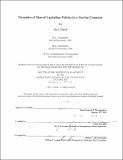Dynamics of shared capitalism policies in a startup company by Joe C. Hsueh.
Author(s)
Hsueh, Joe C. (Joe Chiao-Jen)
DownloadFull printable version (68.41Mb)
Other Contributors
Sloan School of Management.
Advisor
John Sterman.
Terms of use
Metadata
Show full item recordAbstract
Shared capitalism is a diverse set of compensation practices through which worker pay, or wealth, depends on the performance of the firm or work group; compensation practices include employee ownership, stock options, and profit sharing. Empirical studies on whether employee ownership improves firm performance offer mixed results. Kaarsemaker (2006), in a 30-year review of the literature, documented that "two-thirds of 129 studies on employee ownership and its consequences found favorable effects relating to employee ownership, while one-tenth found negative effects. However, favorable effects do not appear to come about automatically, and the specific conditions under which they do are largely unknown." This dissertation attempts to address the question: under what conditions do shared capitalism policies improve firm performance? A system dynamics model of high performance work systems estimated using the NBER Shared Capitalism dataset and calibrated to a clean technology startup company is presented. The model provides an explicit causal mechanism to explain how various shared capitalism policies and HR practices influence employee behaviors that drive business processes, and how those business processes interact with market conditions to generate firm performance in a dynamic feedback system. Simulation analysis explaining how various combinations of salary, stock grants, stock options, profit sharing and employee participation influence employee behaviors and firm performance offers insights into the dynamics of shared capitalism policies. One critical insight is that employee ownership and profit sharing create and mediate the strength of the reinforcing feedback loops from firm performance to employee behavior. Salary and participation are direct effects that influence job satisfaction and productivity but do not close the firm performance-employee behavior loop. Employee ownership along with participation effort improves firm performance significantly because closing the firm performance-employee behavior loop amplifies the direct effects of salary and participation. Thus, the more wealth is shared through broad-based employee ownership, the more wealth is created, given the appropriate conditions. Eleven propositions on the conditions under which shared capitalism policies improve firm performance are presented.
Description
Thesis (Ph. D.)--Massachusetts Institute of Technology, Sloan School of Management, February 2011. Cataloged from PDF version of thesis. "January 2011." Includes bibliographical references (p. 308-314).
Date issued
2011Department
Sloan School of ManagementPublisher
Massachusetts Institute of Technology
Keywords
Sloan School of Management.